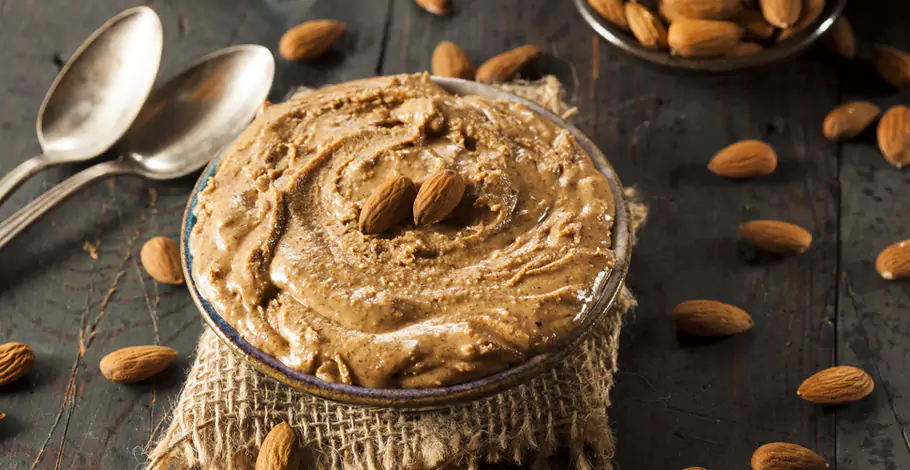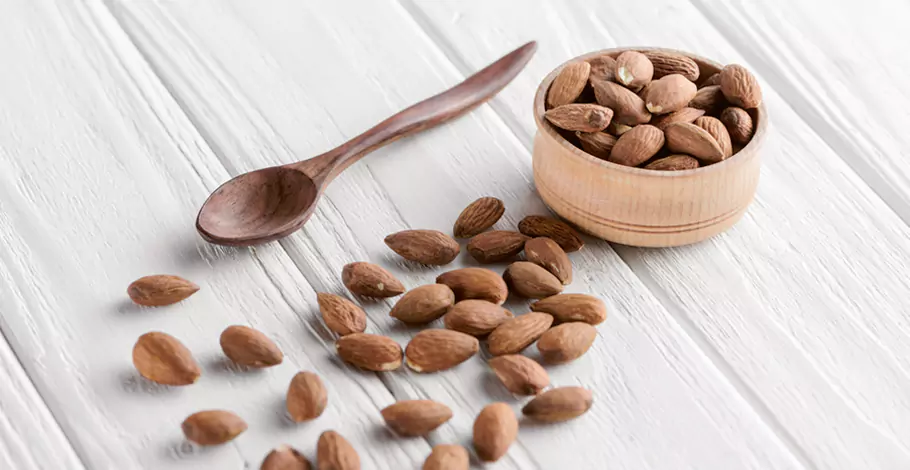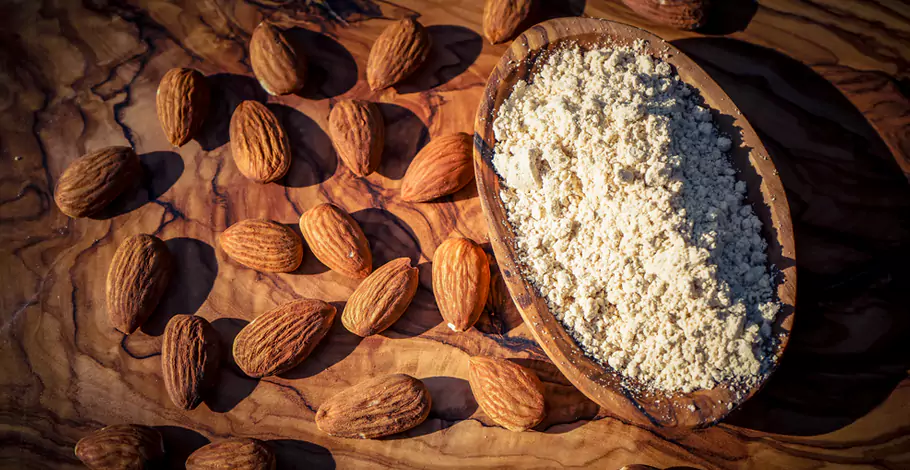It’s no secret that almonds are a healthy source of fat, antioxidants, vitamins, and nutrients, but did you know they are also a great source of protÍein?

Whether you want a quick and healthy snack to munch on, need an extra bit of protein to end your day, or just need something to throw on top of your morning oatmeal, almonds are a great choice.
Are Almonds a Good Source of Protein?
As far as nuts go, almonds are pretty high in protein. According to the Harvard T.H. Chan School of Public Health, one ounce of almonds contains about 165 calories, 14 grams of fat, and 6 grams of protein[1].
Almonds are a calorie-dense food and are filled with essential vitamins and minerals everyone needs as part of a well-rounded and healthy diet.
While almonds themselves are not extremely high in protein compared to animal sources, when you take out the fat and turn them into a powder, they can be a great source of protein that can aid in all your muscle-building needs.
One thing to note is that because almond protein is considered a plant protein source it is not a “complete protein.” But what does that mean?
According to the World Health Organization (WHO), a complete protein is a protein that “contains adequate proportions of the nine essential amino acids[2].”
While our body creates amino acids, it doesn’t create the nine that are essential to our body's ability to properly function—those have to come from food.
Pair your almonds or almond protein with legumes like pea protein, animal products such as meat or eggs, or other grains or seeds to make them a complete source of protein.

From raw almonds to superior protein: A visual journey
How is Almond Protein Made?
Almond protein powder is a good alternative for anyone who wants to gain muscle but is allergic to whey, soy, and other types of protein[3].
Most almond protein powder is made by taking the skin off of the almonds, squeezing the oil out of the almonds, and then grinding them into a fine powder.
This process makes the powder smooth and easier to add to things like smoothies, oatmeal, and milk or water for a protein-packed shake.
While the process of making almond protein might decrease the amount of healthy antioxidants given, most of them are concentrated in the brown skin that is removed, most of the protein is salvaged during this process.
Does Almond Milk Have Protein?
If you’re looking for a good source of protein after a hard workout, almond milk is probably not the first place you should turn[4].
With just 1 gram of protein for an 8-ounce serving, it’s not high in protein by any means.
To make almond milk you start by soaking almonds in water anywhere from one night to a few days depending on the level of creaminess you’re looking for.
After you soak the almonds, you remove them from the water and grind them in a blender or food processor with fresh water, salt, and any flavor add-ins you want. From there, you drain the liquid you get from the leftover ground almond meal.
Because of this processing, the majority of almond milk is usually water. With this, it is usually a low-protein beverage.
Almond Butter vs Almond Protein: What's the Difference?
While they are both delicious, almond protein and almond butter are two totally different products in terms of how they are made and what macro and micronutrients they possess.
Unlike almond protein which is made by deskinning the almonds, taking the oil out, and then grinding them into a powder, almond butter uses the entire almond. Making almond butter at home is actually really simple.
All you need is a blender or food processor, almonds, and any sweetener you want like maple syrup or honey. Blend until smooth and you have almond butter!
The nutritional content of almond powder and almond butter is also a little different.
Because almond protein takes off the skin, you won’t get all the vitamins and minerals you would have otherwise, and you won’t get all of the fat either.
With almond butter, on the other hand, you are more likely to get the beneficial ingredients plus the extra fats you lose out on with a powder form.

Almond Protein Good For Muscle Growth
Is Almond Protein Good For Muscle Growth and Recovery?
Getting an adequate amount of protein is a key building block to getting bigger and stronger.
With this, the average healthy person who is attempting to gain muscle needs about 1.2-1.7 grams of protein per kilogram of body weight per day.
Plant-based diets have become increasingly popular in the last few years.
Whether someone has an allergy to soy or dairy or just a personal preference for the taste, almond protein has become a popular choice for those who want to gain muscle and recover better with the help of a protein powder.
Regardless of how it’s consumed, almonds are an excellent source of protein, especially when they are paired with other ingredients to make them “complete”.
As long as you are getting enough almond protein to hit your daily protein goals, you will be able to grow muscle and aid your recovery effectively.
Does It Have BCAAs?
Vegans and vegetarians can get a portion of their daily dose of BCAAs from plant sources such as almonds.
While almonds themselves are not high in BCAAs, they contain about 3 grams per every 100 grams, they can be a piece of the recommended daily intake of 20 grams.
Could I Be Allergic to Almond Protein Powder?
If you are allergic to tree nuts, such as almonds, it is likely you are also allergic to almond protein powder given it is made with almonds.
Proceed with extreme caution if you are sensitive to almonds or have a nut allergy. Don’t try any product containing almonds unless you are sure you are safe to do so.

Almond Protein Powder
What are the Possible Risks of Side Effects?
Nut allergies occur because your body’s immune system treats the proteins found in nuts as a potential threat to your body.
The response?
Anything from a rash and tingling in your mouth and throat to Anaphylaxis, a life-threatening allergic reaction that can occur minutes after you’re exposed to an allergen.
Make sure to avoid any almond products if you know you have an allergy and consult with your doctor if you want to try almond protein but are allergic to other tree nuts.
4 Sources
We review published medical research in respected scientific journals to arrive at our conclusions about a product or health topic. This ensures the highest standard of scientific accuracy.
[2] Protein and Amino Acid Requirements in Human Nutrition : https://iris.who.int/bitstream/handle/10665/43411/WHO_TRS_935_eng.pdf
[3] Comparison of Whey Versus Almond Protein Powder on Nitrogen Balance in Female College Students; The California Almond Protein Powder Project (CAlmond-P3) : https://www.ncbi.nlm.nih.gov/pmc/articles/PMC8620843/
[4] Dairy and Plant-Based Milks: Implications for Nutrition and Planetary Health: https://www.ncbi.nlm.nih.gov/pmc/articles/PMC10504201/







 This article changed my life!
This article changed my life! This article was informative.
This article was informative. I have a medical question.
I have a medical question.
 This article contains incorrect information.
This article contains incorrect information. This article doesn’t have the information I’m looking for.
This article doesn’t have the information I’m looking for.